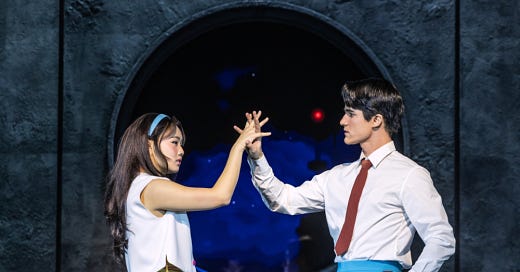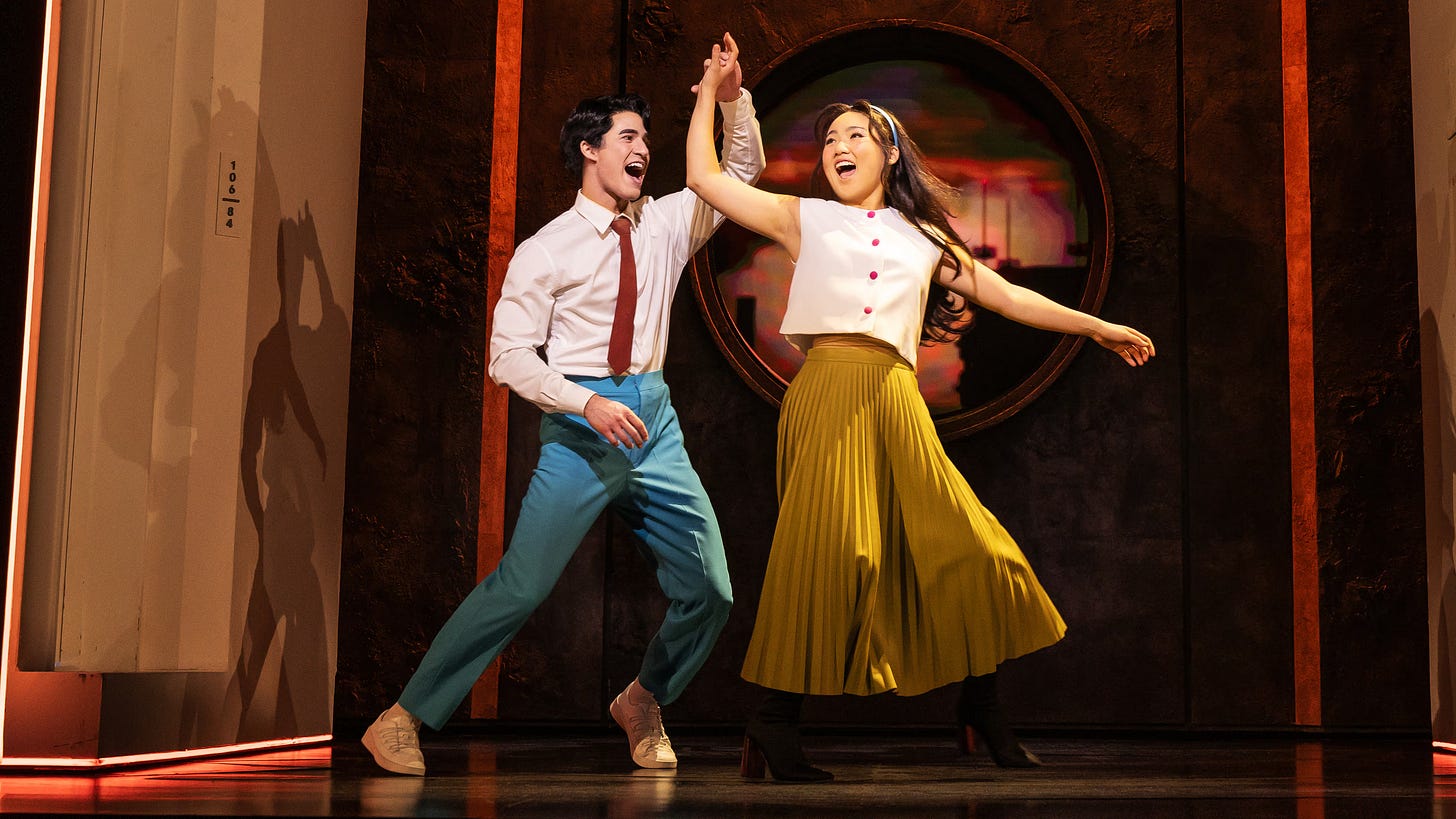If you’re wondering what my current hyperfixation is, you’ve come to the right place. Maybe Happy Ending (by Will Aronson and Hue Park, directed by Michael Arden) is my favorite musical currently on Broadway, and easily and deservedly makes it into my top 3 favorite musicals of all time. If you’re able, I highly recommend you go and see it! (Maybe Happy Ending Tix)
Okayyy, let’s get into it!
**WARNING: Spoilers Ahead**
Maybe Happy Ending had all the makings of something I would personally enjoy from the very start — it’s a musical, it’s about robots (I am a big fan of the humanized AI/robot storyline), and it’s a love story. It also takes place in South Korea and was originally performed there in 2016, making it feel even closer to my heart. When I watched it in previews for the first time, I loved it even more than I thought possible.
Some quick notes/context:
Synopsis: Claire (Helen J Shen) and Oliver (Darren Criss) are 2 obsolete robots called “helper bots” in 2064 Seoul who meet and maybe fall in love.
I’ve watched it on Broadway at the Belasco Theater 3 times (once in previews), twice from the mezzanine and once from the orchestra. The mezzanine seats were pretty far right, so the view was partially obstructed. The orchestra seats were center, with just slight obstruction of the highest parts of the set/stage, but this was minor.
The cast is largely Asian American so yay representation! (Helen J Shen is Chinese, Darren Criss is half Filipino, and Marcus Choi is Korean).
From the reviews I’ve read and conversations I’ve had thus far, MHE is doing quite well, receiving well-deserved high praise from critics and theatergoers alike. The sleek, dynamic set design, Shen and Criss’s compelling singing and acting, and the moving exploration of love between two helper bots who are more human than you might think are a few of the main highlights. The main cast members—Darren Criss, Helen J Shen, Dez Duron, and Marcus Choi—are all exceptional and I was moved to tears multiple times throughout. I could rave on and on about it, but I’ll leave it at that for now and instead share my thoughts on some of the aspects I haven’t seen discussed as much.
The James-Junseo father-son relationship. I was really interested in this dynamic, especially because we don’t know much about it until the last chunk of the show. The crux of their relationship is revealed when Junseo expresses resentment at Oliver’s closeness to his father. Junseo says something along the lines of: It was hard enough to talk to my dad without his perfect, fake son being around all the time (Oliver being the “perfect fake son”). I’d argue that it is significant to see this moment performed in a Broadway show, as it is simultaneously “universal” and culturally specific. The universality of a strained parent-child relationship is something that anyone, regardless of culture, may relate to. But from a Korean cultural perspective, this moment also alludes to the deeply ingrained value of filial piety and the complicated dynamics of parent-child relationships. If Junseo was not able to fulfill this role of helping and taking care of his parents, at least in their eyes, it is easy to see how Oliver (someone whose original sole purpose is to help, as he states himself) would fill that void. In this reading, the parallel between helper bot and son is even more layered and amplified, and the “replacement” of Junseo by Oliver more emotionally impactful. Junseo’s hurt at feeling compared to Oliver by his father is also resonant with Asian cultural experiences. All the while, this aspect of the story continues to operate on the “universal” level, allowing wide audiences to connect to this very human relationship in various ways.
Moving on to larger themes of the show, specifically the idea of endings and the feelings around them. During Claire’s song “The Way That It Has To Be,” one of the lines that stands out to me is: “Who says endings must be sad, who says goodbyes aren’t just routine, seems like a normal thing to me.” Claire offers a compelling perspective, at least for someone like me who is very emotional about endings in all ways shapes and forms. And isn’t she right, that endings and goodbyes are indeed routine and inevitable parts of living? Does Claire herself believe this statement by the end of the show though? I’d argue that she changes her mind, that experiencing love breaks down her cynicism and allows her to acknowledge the sadness of endings, because she now also acknowledges the joy and happiness of loving and living. And I believe that this is one of the most important and resonant messages, that endings are “routine” and an undeniable part of being alive, and we can and will be sad about them. And by extension, in order to love and live fully, we must also accept the heartache and sadness that comes with loss. The fact that the show explores this theme through non-human helper bots is especially clever in my opinion — first, it gives the viewer some distance from the story, allowing one to see the ins and outs of love and relationships through a new lens, because it’s not just another love story between humans. Additionally, this choice creates a sense of optimism and hope — if two helper bots can find love, then maybe so can I.
Perhaps this line of thinking then begs the unanswerable question: What is love? One might also argue that love is a human construct, so how can robots experience this? I don’t think the latter is the question to ask here, at least not in this particular conversation (I do have thoughts though, maybe for another post). But the general “what is love” question is present throughout the show, both in explicitly stated moments (the conversation between Claire’s old owner Jiyeon and Jiyeon’s partner) and in subtler ways (the Claire and Oliver being in a relationship sequence). I’ve tried to answer this question for myself many, many times over the years, and while I will not attempt to articulate an answer at this very moment, I will say that MHE has led me closer to an understanding of love and what it means to live and be alive.
I’ll end with some thoughts on the show’s final scenes (which btw had me fully sobbing). Claire and Oliver agree to erase their memories of each other to avoid the pain that comes with love and loss, and we get a beautiful, breathtaking sequence showing the process of deleting their memories. There is a blackout, followed by the appearance of two pinpoints of light floating around like fireflies — implied to be Claire and Oliver. Then, the Oliver in his room sequence from the beginning starts again, followed by Claire knocking on his door. As this same interaction unfolds, it becomes clear that Oliver did not erase his memories, as he leans over and tells Hwaboon not to tell Claire. Claire is subtler and harder to read, but she does ask Oliver if he thinks it will be okay, to which he responds “I hope so.” She looks off sadly into the distance as Oliver continues to look at her. The question and the pensive look seem to imply that Claire also did not erase her memories, as these parts of the interaction diverge from the original scene. Alternatively, perhaps she did erase her memories, but the differences come from some sort of felt experience stored in her body. On that note, the original scene may not even have been the first time these events played out. Could Claire and Oliver be in a cycle of meeting, falling in love, and erasing their memories over and over again? There is something incredibly romantic and also heartbreaking about this thought. It does bring me comfort, though, to know that they will return to each other over and over, with or without their previous memories. And in this perpetual loop, perhaps they may finally find each other in a place where endings don’t exist.






